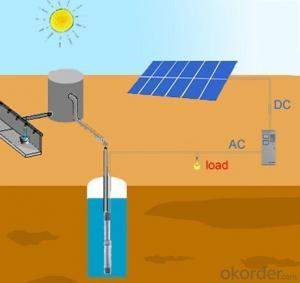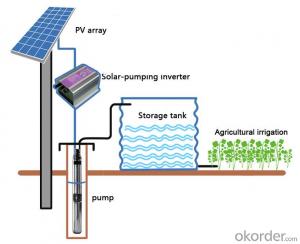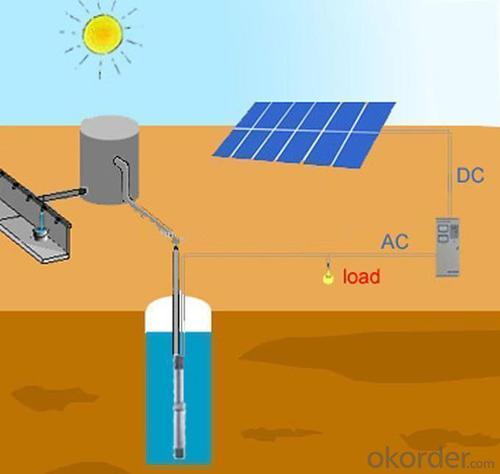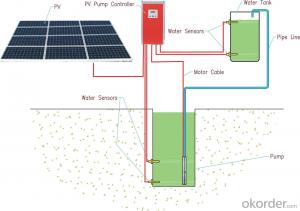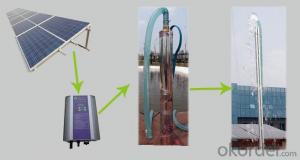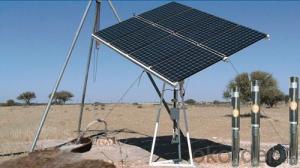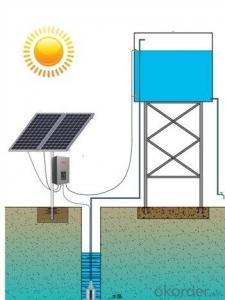Solar Powered Pond Pump Solar Water Pumps
- Loading Port:
- Shanghai
- Payment Terms:
- TT OR LC
- Min Order Qty:
- 1 set
- Supply Capability:
- 1000 set/month
OKorder Service Pledge
OKorder Financial Service
You Might Also Like
Solar Water Pump
DC solar water pumping system consists of the motor, pump, controller, solar array and some other accessories, such as water level sensor, float switch, etc. Considered that storing water is more efficient than storing electricity, the system is designed to directly drive the pump without battery which can reduce the construction and operating cost and routine maintenance effectively.The PV array consists of multiple solar panels connected in series/parallel, which can supply the whole system as power source by converting the absorbed solar radiation energy to the electrical energy. The pump driven by a brushless DC permanent magnet motor draws water from deep-well or river. The pumped water is then fed into reservoir or water tank, or connected to the irrigation system or fountain system directly.
Advanced Technology
Applications Innovation
The efficiency of DC brushless permanent magnet motor has been increased up to 25% in comparison with traditional asynchronous motor.
Technology Innovation
Stator and rotor are sealed by environment friendly casting resin.Motor insulation resistance can be hold higher than 300MΩfor more than 10 years, which consumedly increased the security and reliability of the submersible motor.
Structure Innovation
Casting resign technology processed stator and rotor as well as the water lubricated bearing make the submersible pump environment friendly.
Feature
High Efficiency & High Reliability
DC Brushless Permanent Magnet Motor
Minimum Maintenance, long Service Life
Environment Friendly Materials, Lubricated Without Oil
Application
Village or Family Water Supply
Animal Drinking Water & Livestock Watering
Garden/Courtyard Irrigation
Swimming Pool
Water Supply for Bivouac or Camping Car
Water Supply for Remote Area
Automatic Control
Operate Automatically, No Need Watching
Maximum Power Point Tracking (MPPT)
Dry-run Protection
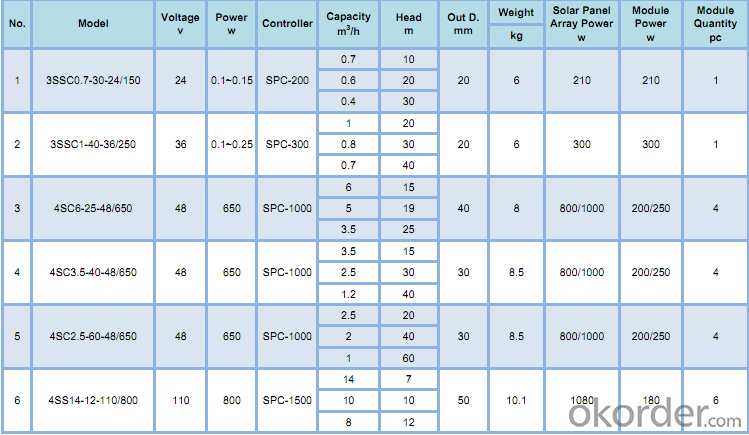
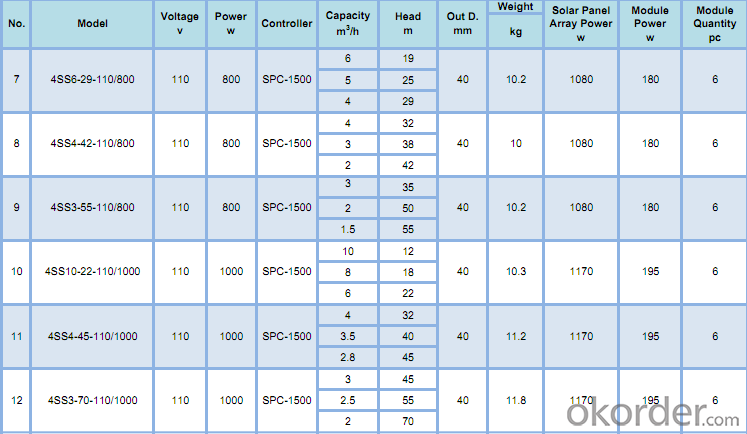
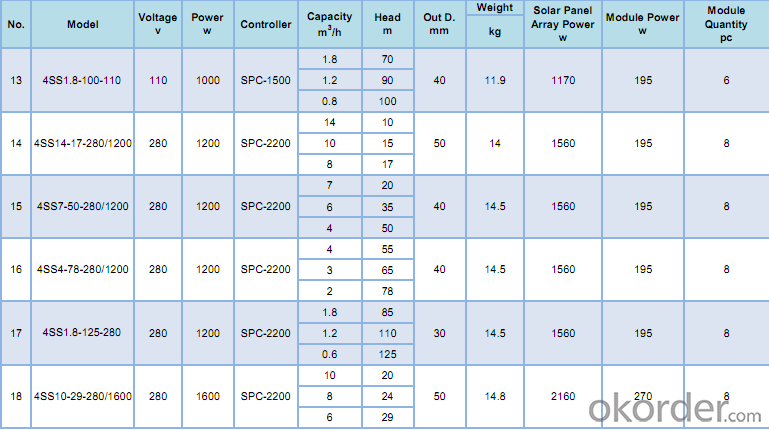
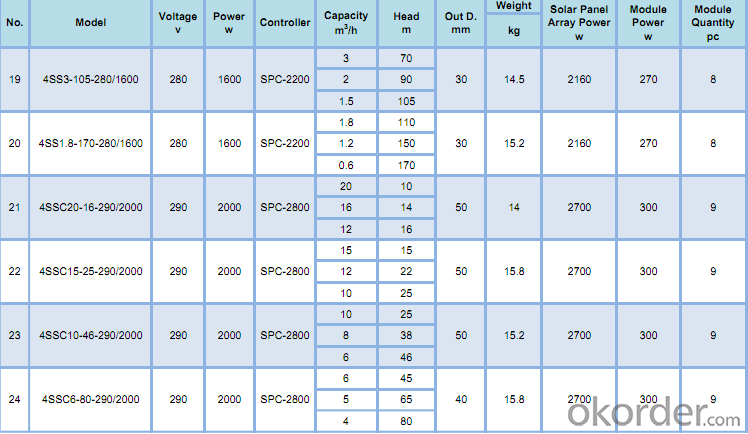
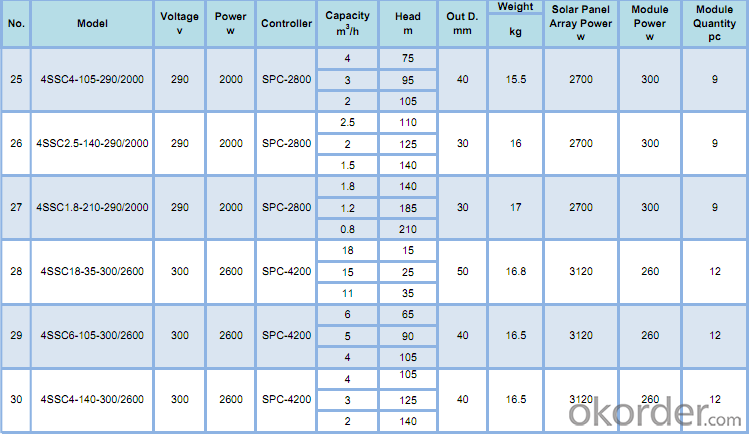
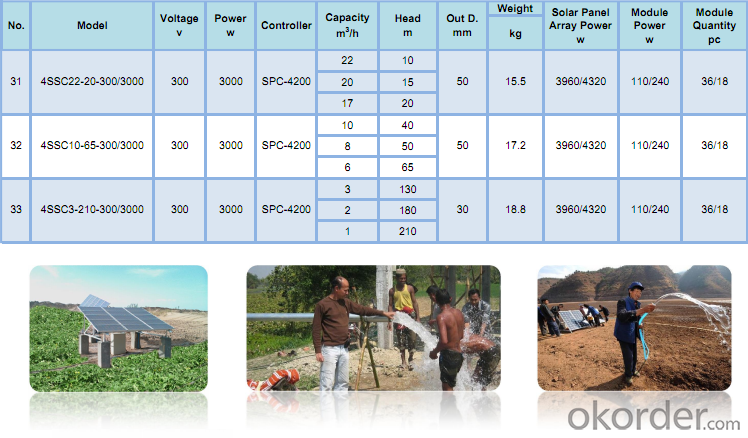
- Q: Can a solar pump be used in areas with limited access to water distribution?
- Yes, a solar pump can be used in areas with limited access to water distribution. Solar pumps are designed to operate independently of grid electricity, making them suitable for remote locations. They can draw water from wells, boreholes, or other water sources and provide a reliable water supply, especially in areas where traditional water distribution systems are not available or unreliable.
- Q: How does the size of the pump motor affect the performance of a solar pump?
- Determining the performance of a solar pump heavily relies on the size of the pump motor. The flow rate, pressure, and overall efficiency of the pump are directly influenced by the motor size. When the pump motor is larger, it enables a higher flow rate, resulting in the ability to pump more water within a given time period. This is particularly important in scenarios where a substantial amount of water needs to be transported, such as in agricultural irrigation or large-scale water supply systems. A higher flow rate guarantees the effective and efficient delivery of the desired volume of water. Moreover, the size of the pump motor impacts the pump's ability to generate pressure. A larger motor is capable of creating higher pressure, which becomes necessary when pumping water to elevated areas or overcoming resistance in an extensive pipe network. The increased pressure ensures that water reaches its intended destination with sufficient force and can be evenly distributed across the irrigation system or other applications. Furthermore, a larger motor often leads to improved efficiency. With a more powerful motor, the pump requires less time to complete its pumping cycle, resulting in reduced energy consumption. This not only saves costs but also promotes a more sustainable utilization of solar energy. It is important to note that while a larger motor generally offers better performance, it also demands more energy to operate. Therefore, it is crucial to find a balance between motor size and energy availability. If the solar array providing power to the pump cannot generate enough electricity to operate a larger motor, it may be necessary to opt for a smaller motor that can still meet the required performance levels without exceeding the available energy supply. To conclude, the size of the pump motor significantly impacts the performance of a solar pump. A larger motor allows for higher flow rates, increased pressure, and improved efficiency. However, it is essential to consider the available energy supply when selecting the motor size to ensure optimal performance and energy utilization.
- Q: Can a solar pump be used in areas with salty or brackish water?
- Yes, a solar pump can be used in areas with salty or brackish water. However, it is important to note that the pump itself should be specifically designed or modified to handle such water conditions.
- Q: Can a solar pump be used in areas with limited access to spare parts or components?
- Yes, a solar pump can be used in areas with limited access to spare parts or components. Solar pumps are designed to be reliable and durable, requiring minimal maintenance. They have fewer moving parts compared to traditional pumps, reducing the chances of breakdowns. Additionally, solar pumps can be easily repaired using basic tools and skills, allowing users in remote areas to fix any issues without the need for specialized expertise or spare parts.
- Q: What are the benefits of using a solar pump?
- There are several benefits of using a solar pump. Firstly, it is a cost-effective and environmentally friendly alternative to traditional pumps that run on fossil fuels. Solar pumps utilize renewable energy from the sun, resulting in reduced electricity bills and lower carbon emissions. Additionally, solar pumps are typically low-maintenance and have a longer lifespan compared to conventional pumps. They are also highly versatile and can be used for various applications such as irrigation, water supply, and livestock management, especially in remote or off-grid areas where access to electricity is limited.
- Q: How efficient are solar pumps?
- Solar pumps are highly efficient as they convert sunlight into electricity to power the pump, eliminating the need for grid electricity or fuel. This not only reduces operational costs but also minimizes environmental impact, making solar pumps a sustainable and cost-effective solution for water pumping.
- Q: Can a solar pump be used in conjunction with a storage system?
- Yes, a solar pump can be used in conjunction with a storage system. The solar pump can be used to draw water from a source and pump it into the storage system, allowing for efficient water storage and distribution even when there is no sunlight available.
- Q: Can a solar pump be used for water circulation in industrial boilers?
- Yes, a solar pump can be used for water circulation in industrial boilers. Solar pumps are designed to utilize solar energy to power the circulation of water or other fluids. They can be used in various applications, including industrial processes like boiler water circulation. By utilizing solar power, these pumps offer a sustainable and cost-effective solution for water circulation in industrial boilers. The solar pump system can be integrated into the existing boiler system to ensure efficient and reliable water circulation, helping to maintain optimal boiler performance and reduce energy consumption.
- Q: How does the performance of a solar pump vary with different solar panel technologies?
- The performance of a solar pump can vary significantly depending on the type of solar panel technology used. Different solar panel technologies have different efficiencies, which directly impact the amount of energy they can convert from sunlight. Firstly, traditional crystalline silicon solar panels, both monocrystalline and polycrystalline, have been widely used in solar pump systems. These panels have a relatively high efficiency, typically ranging from 15% to 20%. This means that they can convert a higher percentage of sunlight into electricity, resulting in improved performance for solar pumps. These panels are known for their durability and long lifespan, making them a reliable choice for solar pump applications. Secondly, thin-film solar panels, such as amorphous silicon, cadmium telluride, and copper indium gallium selenide (CIGS), offer different performance characteristics. Thin-film panels have lower efficiencies compared to crystalline silicon panels, typically ranging from 10% to 12%. While their efficiency may be lower, thin-film panels have the advantage of being lightweight, flexible, and easy to install. Therefore, if the available space for solar panels is limited or if flexible panels are required, thin-film technology can be a suitable choice for solar pump systems. Lastly, emerging solar panel technologies like perovskite and multi-junction solar cells are being researched and developed. These technologies have the potential to achieve higher efficiencies compared to traditional silicon panels. Although they are not yet widely available or economically viable for large-scale applications, they hold promise for future advancements in solar pump performance. In summary, the performance of a solar pump is directly influenced by the solar panel technology used. Higher efficiency panels, such as crystalline silicon, can generate more electricity from sunlight, resulting in improved pump performance. However, factors such as cost, available space, and specific application requirements should also be considered when selecting the most appropriate solar panel technology for a solar pump system.
- Q: Is it possible to retrofit an existing pump system with solar power?
- Yes, it is possible to retrofit an existing pump system with solar power. Retrofitting involves integrating solar panels and a solar power converter into the existing system. The solar panels would be installed in a location where they receive maximum sunlight exposure, typically on the roof or nearby area. The solar power converter is then connected to the existing pump system, allowing it to draw power from the solar panels. This setup enables the pump system to operate independently of the electrical grid, reducing or even eliminating the need for conventional electricity. Retrofitting with solar power offers several advantages, including lower operating costs, reduced carbon emissions, and increased energy independence. However, it is important to consider the specific requirements of the pump system and ensure that the solar power capacity is sufficient to meet the system's needs.
Send your message to us
Solar Powered Pond Pump Solar Water Pumps
- Loading Port:
- Shanghai
- Payment Terms:
- TT OR LC
- Min Order Qty:
- 1 set
- Supply Capability:
- 1000 set/month
OKorder Service Pledge
OKorder Financial Service
Similar products
Hot products
Hot Searches
Related keywords
